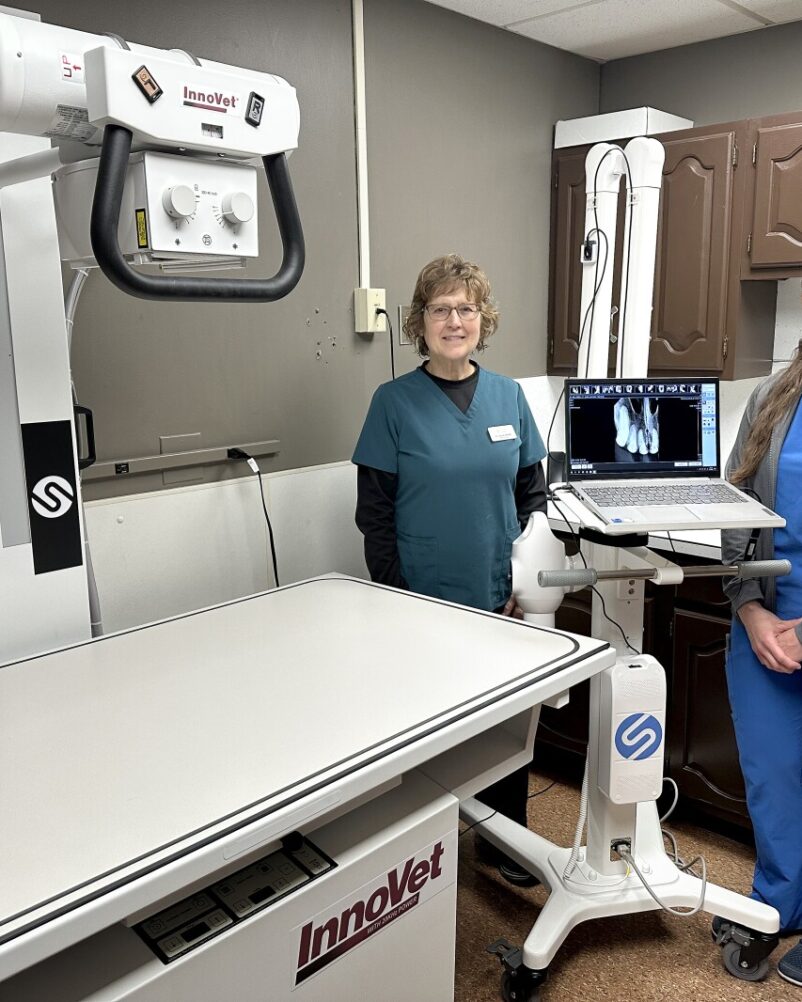
WORTHINGTON — Veterinarians Connie McNab and Ashley Propst work daily to ensure their clients get the best health care, and they now have two new pieces of technology at the Veterinary Medical Center in Worthington to diagnose health issues quicker, and with greater accuracy.
Within the past two months, the VMC has added an Imagyst microscope with artificial intelligence, as well as a new dental x-ray machine to help treat people’s pampered pets.
Propst said the Imagyst machine is used to assist veterinarians and technicians in checking fecal samples for eggs of intestinal worms, do blood smears and check for ear and skin infections. In the near future, it will be able to process urine samples as well.

Julie Buntjer / The Globe
The new technology also allows staff to share slides electronically with pathologists worldwide and get a response within two to three hours. In the past, physical slides were mailed to a pathologist, which often resulted in a lengthy wait of days or even weeks for a diagnosis.
“All of those things were done manually before by a technician or a veterinarian,” Propst shared. “We do still review to make sure the results make sense.”
The technology helps the veterinarians be more efficient, and help more clients.
“It’s a time-saver (to have someone) looking at fecal samples and ear swabs while we’re making a plan or talking to the owner about the patient — or seeing another patient,” Propst shared.
The technology includes a consultation portal for veterinarians to talk with specialists about cases. Already in the two months since the Imagyst arrived, Propst consulted with a veterinarian from Australia and McNab received a response on a consult from a veterinarian in the United Kingdom.
For a rural clinic like Worthington’s, where a referral isn’t always an option, Propst said she and McNab are able to make the best plan and provide the best care for the pet through the aid of consultations.
“It definitely helps you to improve your medicine,” shared McNab, a 35-year veterinarian. Her consultation with the UK veterinarian took place via Zoom on a Sunday evening, as it was already Monday in the UK.
It definitely helps you to improve your medicine.
Veterinarian Connie McNab
“We have the option to choose phone or email, depending on what works for us,” Propst shared. They can either request a certain specialist or submit questions and scans and the first available specialist — whether it’s for an internal medicine consultation or dermatology sample for cancer or skin infection — will respond.
Propst said one of the most common uses for the technology thus far is to diagnose ear infections in dogs.
“We prepare a slide, put it under the Imagyst and it gives a report and tells us if it’s bacteria and the shape of the bacteria, or if it has yeast,” she said. “It also tells us if there are white blood cells (present). That helps to tell us what kind of ear infection the dog or cat has so we can treat it effectively.”
The program also writes a report using artificial intelligence to explain to the pet owner what was found and what level the infection is. Meanwhile, the veterinarian develops the course of treatment.
Propst said pet owners appreciate having the additional information, which also includes images of the bacterial or yeast infection.
The Imagyst technology launched in 2020, and the VMC has been selected to be the pilot for the newly developed urine sample program. They will begin using that technology within the next week, and it will become available to vet clinics worldwide in a couple of months.
“For the fecal samples, (the technology) saves a lot more time because the method they have for the machine is faster than our previous methods for preparing the fecal sample,” Propst said. “Fecal samples take more time to look through. You have to look through every inch for those eggs. Where we would have a person doing that for 15 minutes … it’s now five to 10 minutes and the person time attached to that is maybe two minutes.”
The new dental x-ray machine at the VMC has been in place for less than a month. It provides the veterinarians with a clearer picture of dental health in dogs.
“With dental health, we see the whites and the crown of the teeth, which don’t always show what’s going on below the surface,” Propst said. Having the ability to take x-rays gives a clear image of whether a tooth has broken off, if there is a tooth root issue, or any other dental disease.
“We had one (patient) just this morning that the tooth above the gum line looked really good, but we found a tooth root abscess,” she added. “Dental health is important because it affects the whole body.”
While positioning the x-ray machine to get the best images has been a learning process, Propst said they’re pleased with the technology.
The Veterinary Medical Center is open from 7:30 a.m. to 5 p.m. Monday through Friday, with extended hours to 7 p.m. on Thursdays.
Julie Buntjer became editor of The Globe in July 2021, after working as a beat reporter at the Worthington newspaper since December 2003. She has a bachelor’s degree in agriculture journalism from South Dakota State University.




